- Home
- Michael Bond
Paddington on Top
Paddington on Top Read online
CONTENTS
1. Paddington Goes to School
2. Paddington Cleans Up
3. Paddington Goes to Court
4. A Birthday Treat
5. Keeping Fit
6. Paddington in Touch
7. Comings and Goings at Number Thirty-two
Back Ad
Books by Michael Bond
Credits
Copyright
About the Publisher
Chapter One
PADDINGTON GOES TO SCHOOL
“Paddington has to go to school?” exclaimed Mrs. Brown. She clutched at the front door of Number thirty-two Windsor Gardens and gazed at the man standing on the step. “But there must be some mistake. Paddington isn’t a . . .” She broke off as Mrs. Bird gave her a nudge. “I mean, he’s a . . .”
“May I ask why he has to go to school?” interrupted the Browns’ housekeeper.
The man consulted a pile of papers in his hand. “According to our information,” he said, “he’s been living here for a number of years and we’ve no record of a single attendance at St. Luke’s or anywhere else for that matter.”
“But he was brought up in Darkest Peru,” exclaimed Mrs. Brown. “His Aunt Lucy taught him all she knew before he left. She had to go into a Home for Retired Bears in Lima, you see, and . . .” Her voice trailed away as she caught sight of the expression on the School Inspector’s face.
“I’m very much afraid,” he said, allowing himself a slight smile, “that neither the Home for Retired Bears in Lima nor Aunt Lucy happen to be on our list of approved establishments.”
He snapped the file shut with an air of finality. “We shall expect to see him at school first thing tomorrow morning,” he continued sternly, “otherwise certain steps will have to be taken.”
Mrs. Brown gazed after the Inspector as he disappeared down the road. “Tomorrow morning!” she repeated. “What are we going to do?”
“I think,” said Mrs. Bird wisely, “there’s only one thing we can do. Make sure that bear arrives on time. After all,” she added meaningly, “we do have his circumstances to think of. I daresay it’s only a matter of the authorities setting their records to rights, but until they do, I think we’d better tread very carefully.
“And if Paddington is going to school tomorrow,” she continued, “we’d better get busy as well. I must sew a name tag on his duffle coat for a start. We shall never hear the last of it if that gets lost.” Mrs. Bird paused at the kitchen door. “Will you tell him or shall I?”
Mrs. Brown gave a sigh. “I will,” she said.
She knew exactly what Mrs. Bird meant. Ever since Paddington first arrived on the scene, she’d had a nagging fear in the back of her mind that something like this would happen if only because they’d never actually reported his arrival to anyone, and the thought of breaking the news to him was not one she exactly relished.
But Paddington took the matter surprisingly well, and while the others busied themselves getting his things ready, he spent the afternoon going through some of Jonathan and Judy’s old textbooks. The rest of the time he spent polishing his suitcase, and that evening he even had a bath without being asked, which was most unusual.
All in all, he looked so spick-and-span the following morning, even Mrs. Bird’s eagle eyes were unable to find fault.
“I still can’t believe it,” said Mrs. Brown, as he set off down the road. “The house’ll seem so quiet without him.”
Mrs. Bird gave a snort. “I should make the most of it,” she said. “You mark my words, it’ll be four o’clock and he’ll be back home again before we’ve had time to turn round.”
All the same, it was noticeable that the Browns’ housekeeper spent an unusually long time cleaning the step that morning, and she didn’t finish it until long after the small figure in a duffle coat and hat had disappeared around the corner.
But Paddington himself didn’t have any time to dwell on the matter. The school was only a short distance away from Windsor Gardens and as he drew near, one of the teachers hurried forward to greet him.
“Good morning,” he said. “I take it you’re one Brown, P.?”
“One brown pea?” repeated Paddington in surprise. He gave the man a hard stare. “No, I’m not. I’m Paddington Brown.”
The man let go of Paddington’s paw. “Er . . . that’s really what I was asking,” he said nervously. “I have instructions to check your arrival. If you hurry, you’ll just be in time for the roll.”
Paddington licked his lips. A roll sounded a very good way in which to start the day. “I think I shall enjoy that,” he announced.
“Good,” said the man, looking somewhat relieved. “We thought we’d put you in the Lower Fourth to start with. Mr. Eustace’s class. That’s until we’ve had time to check your capabilities.” He beckoned to a boy who was standing nearby. “Young Smith here will show you where to go.”
“Gosh! Fancy putting you into old Eustace’s class,” said the boy sympathetically as he led the way into the main building. “Hard luck! I should watch it. If he gets his knife into you, you’ll be for it.”
Paddington looked around nervously as he followed the boy into the classroom. It was a large room with windows running the length of one side. There was a blackboard on an adjoining wall and a number of desks were dotted around facing it. But although there were several other pieces of equipment he couldn’t see any actual cutlery, and he breathed a sigh of relief as he was ushered towards the front of the class.
There were about thirty other pupils already in the room and they all crowded around, anxious to make his acquaintance. Paddington was a popular figure in the neighborhood and most of the class wanted him to sit near them.
There was soon an argument raging, and it was while the excitement was at its height that the door suddenly opened and an angular figure in a tweed suit entered the room.
“What’s the meaning of this?” he bellowed. “Back to your desks at once!”
Standing on a platform in front of the blackboard, he glowered down at the class as they scurried to their places.
“Now,” he called sarcastically, when order had been restored, “I assume I have your permission to take the roll?”
Anxious to make a good impression on his first day, Paddington busied himself behind his desk lid. “I shan’t be a moment, Mr. Eustace,” he called. “I’ve nearly finished. I’ve got over thirty-three already!”
“Over thirty-three?” repeated the Form teacher in surprise.
“That’s right,” said Paddington. “That’s one each and three spare.”
“One each and three spare?” Mr. Eustace stared at Paddington as if he’d suddenly lost the use of his hearing. “Three spare what?”
“Marmalade sandwiches,” explained Paddington cheerfully. He lowered his desk lid. “I hope they’ll do. I’m afraid I didn’t bring any rolls. But I’ve got some sliced loaf and some of my special marmalade from the cut-price grocers.”
“Marmalade sandwiches!” spluttered Mr. Eustace. He bounded from the platform, all thoughts of checking the list of those present driven from his mind as he peered inside Paddington’s desk.
“I’ve a good mind to take these to the headmaster!” he cried.
It was Paddington’s turn to look as if he could hardly believe his ears. “All thirty-three?” he exclaimed in amazement. “Even I’ve never managed that many.”
“Silence!” shouted Mr. Eustace as a titter ran around the room.
“I mean,” he said, breathing heavily as he turned back to Paddington, “that I am confiscating them. Marmalade sandwiches indeed! I’ve never heard of such a thing.”
Paddington slumped back into his seat. He’d never heard of anyone having their marmalade s
andwiches confiscated either, and he looked most offended.
“You’re not here to learn how to make sandwiches,” said the teacher as he removed the pile and placed it on his own desk. “You’re here to learn the three Rs.”
“The three Rs?” repeated Paddington in surprise. Despite his feeling of indignation at the unexpected loss of his sandwiches, he couldn’t help being interested at this sudden turn of events. “I didn’t know there were three Rs.”
“Ah,” said Mr. Eustace, with satisfaction. “We learn something new every day. The three Rs,” he continued, “are Reading, Writing, and Arithmetic, and today we happen to be starting with arithmetic.”
He turned to the blackboard. “Now,” he said, pointing to some figures, “I have written out a little problem, and I’ve made a deliberate mistake. Can anyone tell me what it is?”
In his haste to be first with the answer, Paddington nearly fell off his seat. “I can!” he exclaimed, raising his paw as high as he could.
“Ah, Brown,” said the teacher, eyeing him slightly less disapprovingly. “I’m glad to see you’re quick off the mark. What is your answer?”
“You don’t spell arithmetic with an R, Mr. Eustace,” said Paddington excitedly.
Mr. Eustace stared at him. “I know you don’t spell it with an R,” he said impatiently.
Paddington’s jaw dropped. “But you just said you did,” he cried hotly. “You said there were three Rs. Reading, Writing, and Arithmetic.”
“You did, sir,” chorused the rest of the class.
Mr. Eustace passed a trembling hand over his forehead. It suddenly seemed unusually warm in the classroom. “I may have said it,” he began, “but I didn’t mean it. That is . . . I . . .”
“I remember what it looks like,” continued Paddington, pressing home his point. “My Aunt Lucy taught me, and she used to write it down. It begins with an A.”
“I’m afraid,” said the teacher wearily, “that I’m not familiar with your Aunt Lucy’s curriculum.”
Paddington opened his suitcase. “I’ll show you a picture of her if you like, Mr. Eustace,” he announced. “Then you’ll be able to recognize it. She had it taken just before she went into the Home for Retired Bears . . .”
“I mean,” said Mr. Eustace testily, “that I don’t know anything about her teaching capabilities—if she has any.”
Paddington gave him a hard stare. It was one of his hardest ever. He was a polite bear at heart, but he was beginning to get upset by the way the conversation was going, especially when it had to do with his Aunt Lucy.
“She’s very good at spelling, Mr. Eustace,” he said stoutly. “She’s always sending me postcards . . .”
“Are you suggesting, bear,” thundered Mr. Eustace, “that I am not?”
“Oh, no, Mr. Eustace,” said Paddington earnestly. “I’m sure it’s very good to get one out of three right.”
Mr. Eustace mopped his brow again as another titter ran round the room. He was normally very keen on discipline, but for some reason or other, he seemed to be losing his touch on this particular morning. It was definitely one of those days. For a moment or two he appeared to be taking advantage of his own arithmetic lesson by practicing some counting, and then, as his eye alighted on the pile of marmalade sandwiches, a thought seemed to strike him.
“Since,” he said, “you clearly have an interest in food, you may like to go out and do some shopping for me.”
“Oh, yes, please,” said Paddington eagerly. He felt as keen as Mr. Eustace to bring the present topic of conversation to an end. “I often do Mrs. Bird’s shopping for her.”
“Good,” said Mr. Eustace. “Perhaps we’ve found our true vocation at last.”
Paddington’s face fell. “Are you coming too, Mr. Eustace?” he asked.
“No,” said Mr. Eustace, slowly and distinctly. “I shall not be coming too. But it so happens I need some fish . . .”
“Some fish?” echoed Paddington, nearly falling over backwards with astonishment. If Mr. Eustace had asked for some chalk for the blackboard or even some rolls, he wouldn’t have been surprised; but fish was the last thing he’d expected.
“Fish,” repeated Mr. Eustace, handing him some money. “Something in the nature of a herring or two would do admirably. You may,” he added hopefully, “take as long as you like.”
“Bears are good at shopping,” said Paddington as he took the money and hurried towards the door, watched by thirty envious pairs of eyes. “I shan’t be long.”
Mr. Eustace gazed after the retreating figure as if that was exactly what he feared, and sure enough, he’d hardly had time to bring the mathematics lesson to an end when the door burst open and Paddington hurried back into the room clutching a parcel wrapped in newspaper.
He looked rather apprehensive as he made his way towards the platform. Mr. Eustace was clutching a knife in one hand and he appeared to be doing something to the contents of an old tin can.
“That was quick, bear,” he said, trying to make the best of things as he looked up. “We’re about to get under way with the next lesson.”
Placing the knife on the table, Mr. Eustace took the parcel and started to unwrap it. As he did so, the smile slowly disappeared from his face. Normally fairly red, his features began to resemble an overripe beetroot as he undid the last of the folds.
“And what is this, pray?” he demanded, holding a package up to the light.
“It’s some fish fingers, Mr. Eustace,” said Paddington. “They were on special offer in the supermarket. The man said they would be all right so long as you eat them before next Tuesday.”
“Eat them!” Mr. Eustace glared at the package. “I don’t want to eat them. I want to cut them up! They’re for my biology lesson.”
Reaching over, he grasped the knife on his desk and with one sweeping movement, pushed the tin can towards Paddington.
“Take this, bear,” he thundered. “I shall call on you when it’s time for practicals.”
Paddington didn’t need asking twice. He had no idea what Mr. Eustace had in mind, but from the look on his face and the way he was brandishing the knife, he had no wish to stay and find out. Clutching the tin in his right paw, he backed towards the classroom door. When he reached it, he held his other paw up as high as it would go.
“If you please, Mr. Eustace,” he exclaimed, “I think I would like to be excused.” And without waiting for an answer, he disappeared up the corridor as fast as his legs would carry him.
Paddington was the sort of bear who believed in going right to the top in times of trouble, and this definitely seemed to be one of those occasions.
On his way in that morning he’d noticed a door marked “headmaster” and he didn’t stop until he reached it.
The headmaster looked up in surprise as Paddington entered his study and collapsed into a chair in front of his desk. “I think Mr. Eustace is going to put his knife into me!” he gasped. “He wants to call on me for his practicals!”
St. Luke’s was a large school, and like all large schools it had its fair share of problems. Even so, the headmaster began to look more and more unhappy as he listened to Paddington’s tale of woe. He hadn’t been best pleased when the Inspector had passed on the news of a new arrival halfway through the term, especially one who apparently hadn’t been to school before, and it seemed as though his worst fears were being realized.
He stood up as a bell began to ring somewhere in the distance. “It does seem as though it’s been one long misunderstanding,” he said. “That’s the midday bell. Perhaps we can talk about it over lunch. There’s nothing like a spot of food for calming the nerves.”
Ushering Paddington through the door, he led the way down the corridor. “You may eat at the teachers’ table,” he continued. “Just for today I’ll make you food monitor. That means you’ll be in charge of all the serving.”
Paddington began to look more cheerful as he listened to the headmaster’s words, and when he saw the pile of foo
d laid out ready for them he grew more cheerful still, despite the fact that out of the corner of his eye he could see Mr. Eustace glaring at him from the other end of the table.
After he’d finished serving out the soup, Paddington turned his attention to an enormous tureen full of stew.
“I think I shall like school after all,” he announced, licking his lips as he passed the first plateful to the headmaster.
“I’m very pleased to hear it,” said the Head. “After all,” he added, “you’ll be with us until you’re sixteen, and that’s a long time.”
“Sixteen!” The ladle fell unheeded from Paddington’s paw, and his eyes nearly popped out of their sockets as he gazed at the headmaster. “Sixteen! But I thought I was only here for the day!”
The headmaster gave a nervous chuckle. “I’m afraid it’s the law now,” he said, hurriedly turning to one of his colleagues. “And there’s no getting away from it.”
Paddington served the rest of the food as if in a dream. In fact, he was so taken up with his thoughts that he quite forgot to give himself any, and several of the teachers were already passing their plates up for seconds.
When he came to again, Paddington began peering into the pot with a thoughtful expression on his face.
“Come along, bear,” called Mr. Eustace impatiently. “Don’t let it get cold. There’s nothing worse than cold stew.”
The headmaster looked round. “Is anything the matter?” he asked. “You look as if you’ve lost something.”
Paddington poked the contents of the pot with a spoon.
“I think I may have dropped Mr. Eustace’s tin in the stew by mistake,” he announced.
All eyes turned towards the end of the table as a loud groan followed Paddington’s remark.
The headmaster jumped to his feet in alarm. “Are you all right, Mr. Eustace?” he asked. “You seem to have gone quite pale.”
Looking at Mr. Eustace, even his best friends would have had to admit that the headmaster’s remarks about his complexion were the understatement of the year. He looked positively green as he sat clutching his stomach. “That tin,” he moaned, “happens to belong to my biology class. It’s the one I keep my worms in!”

 Paddington on Top
Paddington on Top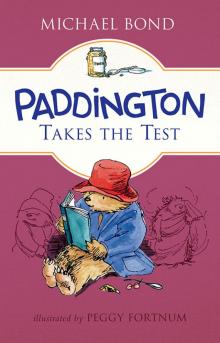 Paddington Takes the Test
Paddington Takes the Test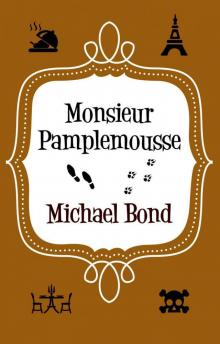 Monsieur Pamplemousse (Monsieur Pamplemousse Series)
Monsieur Pamplemousse (Monsieur Pamplemousse Series)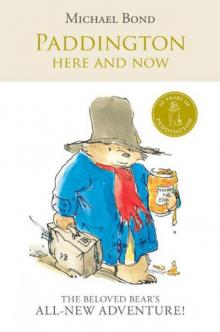 Paddington Here and Now
Paddington Here and Now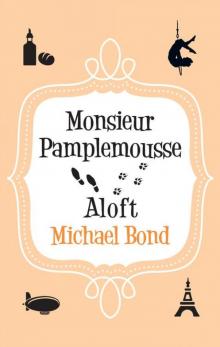 Monsieur Pamplemousse Aloft
Monsieur Pamplemousse Aloft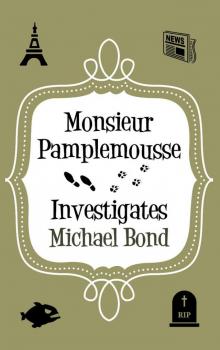 Monsieur Pamplemousse Investigates
Monsieur Pamplemousse Investigates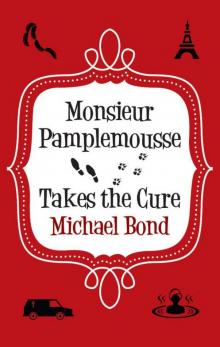 Monsieur Pamplemousse Takes the Cure
Monsieur Pamplemousse Takes the Cure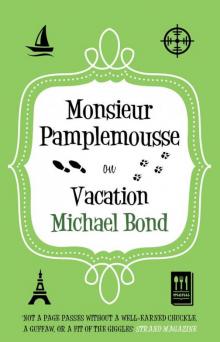 Monsieur Pamplemousse on Vacation
Monsieur Pamplemousse on Vacation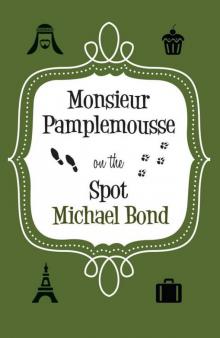 Monsieur Pamplemousse on the Spot
Monsieur Pamplemousse on the Spot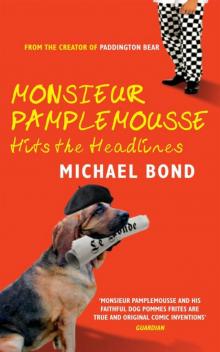 Monsieur Pamplemousse Hits the Headlines
Monsieur Pamplemousse Hits the Headlines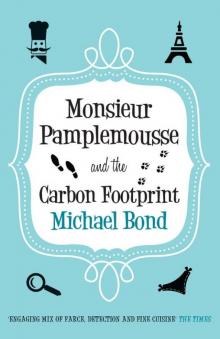 Monsieur Pamplemousse and the Carbon Footprint
Monsieur Pamplemousse and the Carbon Footprint Love from Paddington
Love from Paddington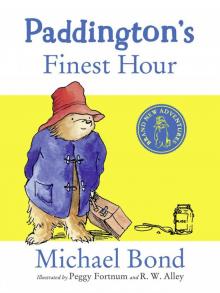 Paddington’s Finest Hour
Paddington’s Finest Hour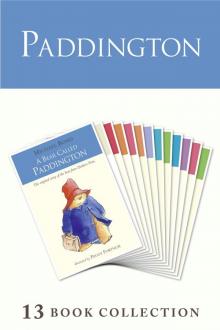 Paddington Complete Novels
Paddington Complete Novels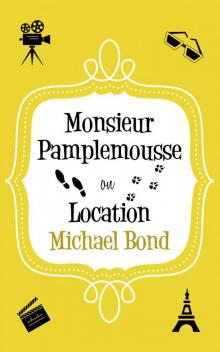 Monsieur Pamplemousse On Location
Monsieur Pamplemousse On Location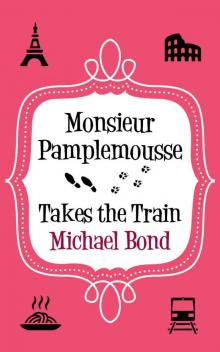 Monsieur Pamplemousse Takes the Train
Monsieur Pamplemousse Takes the Train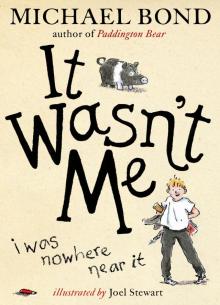 It Wasn’t Me!
It Wasn’t Me! Paddington Races Ahead
Paddington Races Ahead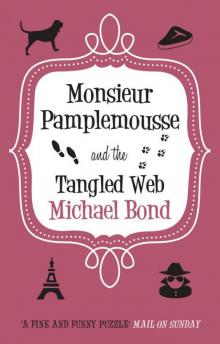 Monsieur Pamplemousse and the Tangled Web
Monsieur Pamplemousse and the Tangled Web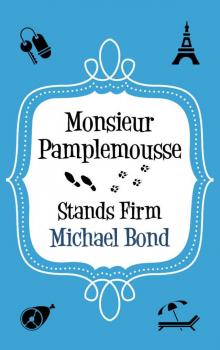 Monsieur Pamplemousse Stands Firm
Monsieur Pamplemousse Stands Firm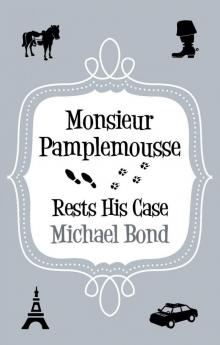 Monsieur Pamplemousse Rests His Case
Monsieur Pamplemousse Rests His Case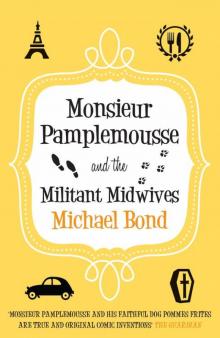 Monsieur Pamplemousse and the Militant Midwives
Monsieur Pamplemousse and the Militant Midwives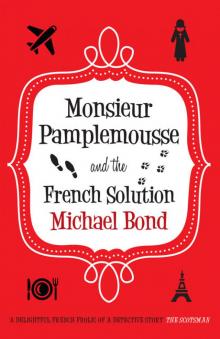 Monsieur Pamplemousse and the French Solution
Monsieur Pamplemousse and the French Solution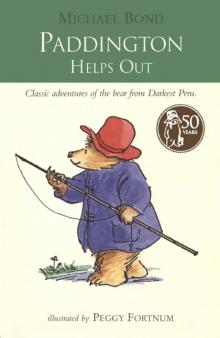 Paddington Helps Out
Paddington Helps Out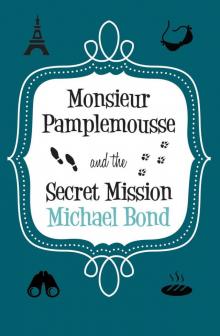 Monsieur Pamplemousse & the Secret Mission (Monsieur Pamplemousse Series)
Monsieur Pamplemousse & the Secret Mission (Monsieur Pamplemousse Series)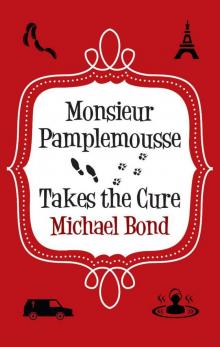 Monsieur Pamplemousse Takes the Cure (Monsieur Pamplemousse Series)
Monsieur Pamplemousse Takes the Cure (Monsieur Pamplemousse Series) A Bear Called Paddington
A Bear Called Paddington